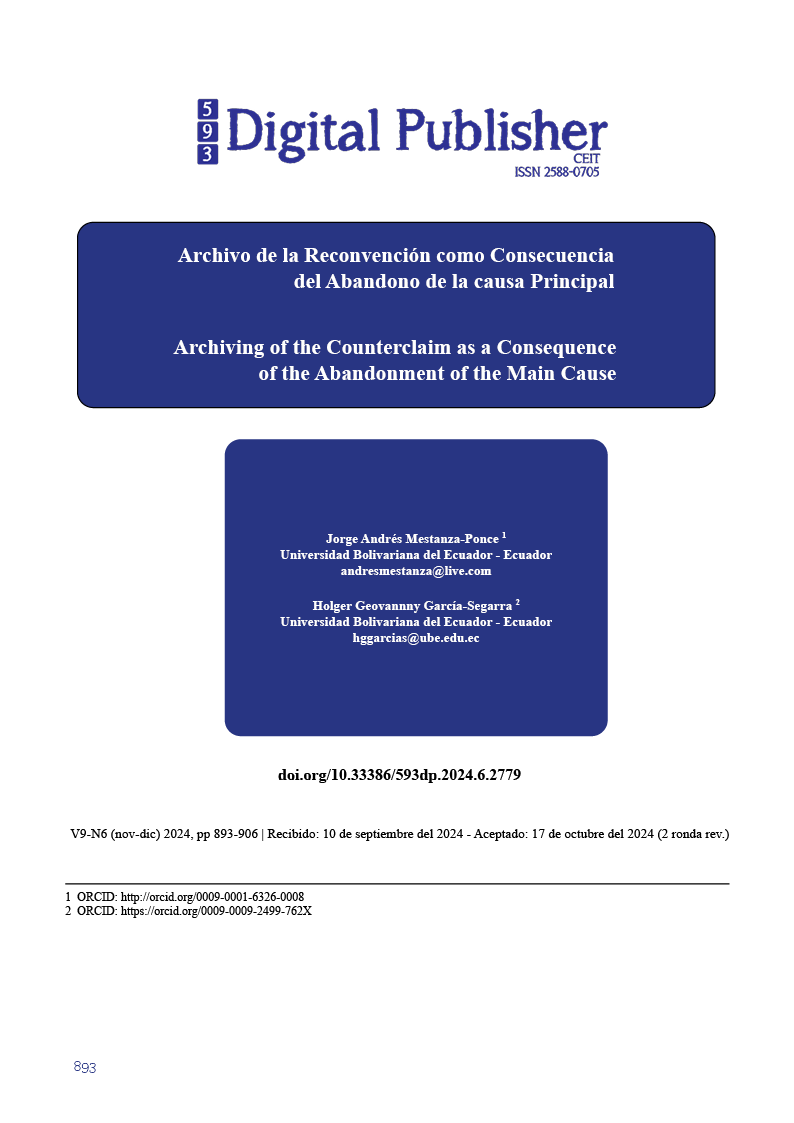Archiving of the Counterclaim as a Consequence of the Abandonment of the Main Cause
Main Article Content
Abstract
The general objective of this study was to determine the legal consequences of the filing of a counterclaim, as a result of the abandonment of the main case. A qualitative methodology with a phenomenological and interpretive approach was used, conducting interviews with legal professionals. The inclusion criteria considered lawyers with experience in counterclaim proceedings, while the exclusion criteria were applied to those without relevant experience. The results revealed that, although the counterclaim is an independent action, its filing together with the main case may violate due process and the rights of the litigants. Most of the interviewees agreed that the counterclaim should continue, even if the main claim is abandoned, and pointed out that Ecuadorian legislation does not explicitly address this situation, generating ambiguities and possible misinterpretations. The general conclusion is that current Ecuadorian regulations lack clarity on the handling of the counterclaim in case of abandonment of the main case, which can lead to inconsistent judicial decisions and the violation of the rights of the counterclaimant. Legislative reform is recommended to ensure the procedural independence of counterclaims, thereby effectively protecting the rights of litigants and promoting a more fair and coherent judicial system.
Downloads
Article Details

This work is licensed under a Creative Commons Attribution-NonCommercial-ShareAlike 4.0 International License.
1. Derechos de autor
Las obras que se publican en 593 Digital Publisher CEIT están sujetas a los siguientes términos:
1.1. 593 Digital Publisher CEIT, conserva los derechos patrimoniales (copyright) de las obras publicadas, favorece y permite la reutilización de las mismas bajo la licencia Licencia Creative Commons 4.0 de Reconocimiento-NoComercial-CompartirIgual 4.0, por lo cual se pueden copiar, usar, difundir, transmitir y exponer públicamente, siempre que:
1.1.a. Se cite la autoría y fuente original de su publicación (revista, editorial, URL).
1.1.b. No se usen para fines comerciales u onerosos.
1.1.c. Se mencione la existencia y especificaciones de esta licencia de uso.
References
Castillo, N. (2021). Fenomenología como método de investigación cualitativa: preguntas desde la práctica investigativa. Revista Latinoamericana de Metodología de la Investigación Social, XX(10), 7-18. Obtenido de http://relmis.com.ar/ojs/index.php/relmis/article/view/fenomenologia_como_metodo/167
Derecho Ecuador . (22 de Marzo de 2022). ¿Cómo procede el archivo de la reconvención si el actor desiste de la demanda principal? Obtenido de Derecho Ecuador : https://derechoecuador.com/como-procede-el-archivo-de-la-reconvencion-si-el-actor-desiste-de-la-demanda-principal/
H. Congreso Nacional. (2011). Código de procedimiento Civil. Quito: Lexis Finder. Obtenido de https://www.planificacion.gob.ec/wp-content/uploads/downloads/2015/04/Codigo-de-Procedimiento-Civil.pdf
León, J. (2023). La reconvención y la práctica de la prueba relativa a esta. Cuenca: Universidad del Azuay. Obtenido de https://dspace.uazuay.edu.ec/bitstream/datos/13211/1/18737.pdf
Maldonado, J., Santillán, J., Acurio, G., & Valderrama, V. (2022). Código orgánico general de procesos del ecuador y su exigencia extralimitada. Revista Universidad y Sociedad, XIV(6), 31-39. Obtenido de http://scielo.sld.cu/scielo.php?script=sci_arttext&pid=S2218-36202022000600031
Medina, E. (8 de Noviembre de 2021). Enfoque interpretativo en la corrección de artículos científicos. Eduweb, XV(3), 286-294. doi:https://doi.org/10.46502/issn.1856-7576/2021.15.03.2
Mejia, J. (2024). La reivindicación en forma de reconvención dentro del proceso de prescripción adquisitiva. Arequipa: Universidad Continental. Obtenido de https://repositorio.continental.edu.pe/bitstream/20.500.12394/14804/1/IV_FDE_312_TE_Mejia_Zegarra_2024.pdf
Nizama, M., & Nizama, L. (2020). El enfoque cualitativo en la investigación, proyecto de investigación cualitativa y seminario de tesis. Vox Juris, XXXVIII(2), 69-90. Obtenido de https://doi.org/10.24265/voxjuris.2020.v38n2.05
Pérez, J. (2022). La reconvención en el derecho de familia. Universidad Internacional de la Rioja. Obtenido de https://reunir.unir.net/bitstream/handle/123456789/13679/P%c3%a9rez%20Camacho%2c%20Jordi.pdf?sequence=1&isAllowed=y
Pico, H., & Morales, M. (2023). Abandono de causas frente a la dificultad de proponer una nueva demanda en materia civil. Revista Metropolitana de Ciencias Aplicadas,, VI(1), 159-167.
Puetate, J., Coka, D., & Méndez, C. (2021). La prueba digital en procesos judiciales aplicables al Código Orgánico General de Procesos (COGEP), a partir de la pandemia COVID-19. Dilemas contemporáneos: educación, política y valores, VIII(3), 1 - 22. doi:https://doi.org/10.46377/dilemas.v8i.2696
República del Ecuador. (2018). Código Orgánico General de Procesos - COGEP. Quito: Lexis Finder . Obtenido de https://www.telecomunicaciones.gob.ec/wp-content/uploads/2018/09/Codigo-Org%C3%A1nico-General-de-Procesos.pdf
UNIR Revista. (22 de Marzo de 2021). ¿Qué es la excepción procesal? Obtenido de UNIR: https://www.unir.net/derecho/revista/excepcion-procesal/



